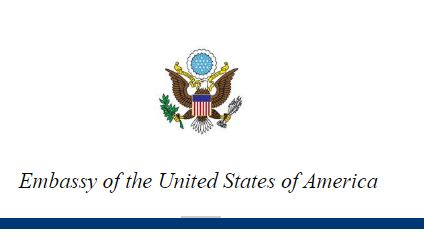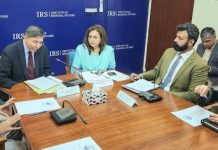SIALKOT, SEPT 24 (DNA) – Sialkot Chamber of Commerce and Industry President Malik; Women’s Sialkot Chamber of Commerce and Industry President Nauman;Distinguished guests, ladies, and gentlemen;
Good afternoon! Thank you for the warm welcome. I understand this is an especially busy month for the Chamber, and I appreciate you making time for this meeting.
As many of you know, this is my second visit to Sialkot. I’m back again because I was so impressed during my first visit with the city’s entrepreneurial spirit, innovation, and significant business achievements. The city of Sialkot truly showcases the strengths of the U.S.-Pakistan trade and investment relationship – as well as the potential for future growth in our bilateral economic partnership.
Before meeting with you today, I visited Medical Devices Limited — a company that is exporting half of its products to the United States. This export-oriented business is supporting Pakistan’s economic growth while creating high-quality jobs for Pakistanis. And shortly after this event, I will visit Dekalb Trade Voice, a manufacturer of leather and textile products. The United States provided technical assistance to help Dekalb improve and diversify its product line, participate in international trade shows, and establish a testing facility. Today, the company has major U.S. corporations as clients, and it provides jobs to skilled Pakistani women workers.
If you look across Sialkot – and across Pakistan as a whole – you will find countless other examples of how the U.S.-Pakistan trade and investment relationship – as well as targeted forms of U.S. assistance to businesses – are benefiting Pakistan’s people and economy. The United States is Pakistan’s largest export market globally, and Pakistan’s exports to the United States have more than doubled over the last decade — a testament to the robust economic relationship we share.
During my previous visit to Sialkot, I had a chance to visit First American Corporation, which exports millions of dollars of sports apparel to the United States each year, as well as Forward Sports, which produces high-quality sports equipment used at world-class sports competitions like the World Cup. The successes of these businesses demonstrate the immense potential of Pakistan’s private sector. But we all know that much of that potential remains untapped. We are supporting Pakistan in unlocking its full economic potential – deepening our economic partnership in ways that directly benefit the Pakistani people.
American businesses play a leading role in this effort. More than 80 U.S. firms directly employ 120,000 Pakistanis and indirectly benefit more than a million Pakistani workers. These U.S. firms not only bring investment into Pakistan — they invest in the Pakistani people, training them for the highest technical and management levels. These employees go on to establish and run their own firms, generating new jobs and opportunities for the people of Pakistan. They bring American values of openness, transparency, and community citizenship to the private sector. They drive critical research and development and support local communities. For example, PepsiCo Pakistan has invested in a range of initiatives to improve the livelihoods of 223,000 local farming community members and to develop agricultural supply chains. These initiatives include mentorship-based training programs for local farmers, transfer of eco-friendly technologies to Pakistani stakeholders, and increased inclusion of women in the agriculture supply chain.
Also in the agriculture sector, the U.S. Foreign Commercial Service is helping a U.S. company from Missouri bring its crop yield-enhancing technology to Pakistani farmers. Recently, our team also helped a company from Kansas set up operations in Pakistan and market its feed manufacturing equipment and services to benefit Pakistan’s livestock sector.
My team and I also continue to engage with Pakistani policymakers on the importance of policy reforms to improve the ease of doing business and attract further investment. To succeed, Pakistan must establish regulatory standards and practices that are regionally and globally competitive. The United States will continue to engage with Pakistan to ensure government stakeholders understand the challenges and concerns of U.S. and other business community stakeholders. And our U.S. Department of Commerce team here in Pakistan will continue to actively support both U.S. and Pakistani businesses that are interested in expanding our trade and investment relationship.
In June, we took a delegation of 24 Pakistani businesspeople to the SelectUSA Conference in the United States, where they made connections with U.S. business and government officials and gained insights into the U.S. regulatory system, in order to support their potential investments in the United States. We also take Pakistani delegations throughout the year to sector-specific trade shows in the United States, and I encourage you all to remain in touch with Consul General Hawkins’ team about these opportunities.
Beyond our consistent efforts to boost the U.S.-Pakistan trade and investment relationship, U.S. assistance programs in Pakistan are also designed to promote Pakistan’s economic growth. We all know that education is a key to a bright economic future, and the United States government is funding a wide range of initiatives to expand the educational opportunities for Pakistani youth. We spend more than $20 million annually to give young Pakistanis the opportunity to participate in free-of-cost academic exchanges, including our prestigious Fulbright program. Recognizing that not all Pakistani youth will have the opportunity to study abroad, we’ve also invested significantly in education right here in Pakistan. For example, earlier today, I inaugurated a new EnglishWorks program here in Sialkot. Through this program, 150 young adults will participate in a six-month program to strengthen the English-language skills needed for success in today’s global job market. Approximately 1,125 youth are participating in other U.S.-funded intensive English-language training programs across Punjab currently. I hope you will hire them!
U.S. grants – not loans – also have constructed hundreds of new schools and rehabilitated thousands more across Pakistan, providing access to quality education for millions of Pakistani children and training for thousands of teachers. Here in Punjab, we currently have an ongoing program to strengthen the quality of training available at 15 business incubation centers in universities across the province. The large and thriving Pakistani-American diaspora community in the United States is also contributing to such efforts, including right here in Sialkot, where a Pakistani-American businessperson is preparing to launch a new school for girls.
Just as access to high-quality education shapes young Pakistanis’ economic futures, access to quality healthcare similarly has a significant impact on Pakistan’s people and economy. Today, Pakistan’s malnutrition crisis continues to threaten the futures of millions of Pakistani children. Since the 2022 floods, the United States has provided nearly $100 million in aid to combat malnutrition, supporting more than 317,000 who are at risk. As part of that effort, I recently delivered 486 tons of food to treat malnourished children in Karachi. But the malnutrition emergency requires sustained, and increased attention here in Pakistan. Those children who survive malnutrition can continue to face lifelong consequences that hold them back from achieving their full potential. As leaders in this city and in this country, I would encourage all of you to consider what more you and your companies can do to ensure all Pakistani youth receive the necessary nutrition to grow up safely and pursue their dreams.
Beyond the United States’ work in the education and health sectors to support the fundamental services necessary for a country’s economic success, our assistance programs through the U.S.-Pakistan “Green Alliance” framework focus on helping Pakistan’s economy become more resilient to climate change. In particular, we are focused on supporting Pakistan in expanding climate-smart agriculture, clean energy, and effective water management.
U.S. assistance has supported infrastructure initiatives, including the rehabilitation and completion of the Mangla, Tarbela, Gomal Zam, Satpara, and Golen Gol hydroelectric projects. These dams provide clean, affordable energy to millions of homes, prevent catastrophic water shortages, and mitigate the damaging effects of flooding. We’ve also established four Centers for Advanced Studies in energy, water, and agriculture across Pakistan that are generating the applied research and innovation needed to help solve the country’s most pressing development challenges. This fall, we are launching a new climate-smart agriculture program with farming families so they can adapt and prepare for a new era of sustainability and improved water management.
We are collaborating and innovating with partners around the world to address the global challenge of climate change. We want to have Pakistan as our partner in this effort. It’s important to emphasize that climate-smart initiatives not only mitigate climate change; they offer Pakistan tremendous economic potential. Green industries are increasingly profitable, expand trade and investment, and create new jobs, new industries, and new opportunities.
Throughout all these efforts to support Pakistan’s people and economy — from climate-resilience programs to education and health programming and beyond — the United States is focused on ensuring our programs are inclusive. I spoke earlier about unlocking Pakistan’s full potential in the private sector, and I think we can all agree that this potential can only be achieved if women are able to fully participate as both leaders and workers in Pakistan’s economy. That’s why the United States funds programs specifically focused on women’s economic inclusion and success — such as the Academy for Women Entrepreneurs training program; our Women in Energy Scholars Program; and our TechGirls exchange program, to name just a few. I look forward to hearing, during our discussion, about the steps each of your companies is making to welcome and develop the next generation of women business leaders.
The examples I’ve shared with you today illustrate the breadth and depth of the U.S.-Pakistan economic relationship, and our strong commitment to Pakistan’s people and their future. The relationship between the United States and Pakistan is vital and has endured. Let’s work together and build on what we have already accomplished and identify new areas of cooperation for a more prosperous Pakistan.

















